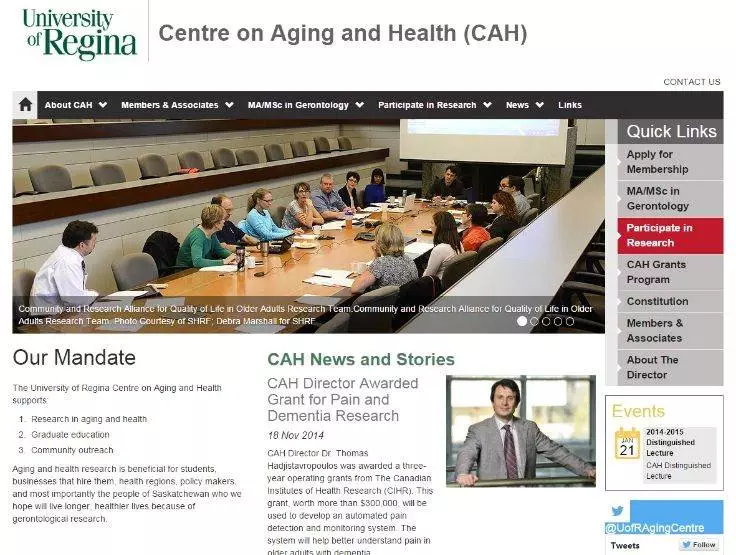
The Centre on Aging and Health is pleased to launch its new website, which will keep the university community and general public aware of CAH activities and research. The new look, easier navigation, and new features (such as Twitter integration, updated web forms, videos, etc.) will make visiting the site more enjoyable but will also allow us to better inform those familiar with and new to the CAH.
Regardless, if this is your first visit the CAH website, or your first time seeing the new one, please take a tour of the site and let us know what you think! We’d like to thank Yves and Brigitte and the entire Noblet Design team for making the new site possible. We are excited about the possibilites this opens up for the CAH.
We just published a state of the art systematic review of pain assessment tools for people living with severe dementia. We provided recommendations for the most supported tools @AIGMcLennan @UofRegina https://www.sciencedirect.com/science/article/pii/S0272735826000139?via%3Dihub
The Winter 2026 CAH Newsletter has stories about:
Research on menopause with Canada Research Chair Dr. Jennifer Gordon, upcoming CAH spring public events, CAH relaunching research participant pool, CAH Director inducted as Fellow of the RSC, and more!
https://research.uregina.ca/cah/newsletters/issue-41/
Congratulations to #URegina's @DrThomasHadjist, newly elected as a Fellow of the @src_rsc. His groundbreaking work is improving care for older adults with #dementia and chronic pain worldwide.
📺 Watch the video below, and learn more in Discourse: 📖 https://bit.ly/3WWYQbC
Two #URegina researchers have been elected Fellows of the @src_rsc — the country’s highest academic honour. 👏
Congrats to Dr. @rncarleton and @DrThomasHadjist, whose research is improving lives across Canada and beyond.
Learn more in Discourse:

Two U of R academics honoured | Discourse Magazine
Two University of Regina researchers elected Fellows of the Royal Society of Canada
bit.ly
📅 Mark your calendars! Join us on Dec 10 for a webinar that explores how building design & operation can protect older adults’ health against extreme heat and wildfire smoke events.
🔗 Don’t miss out—register today: https://shorturl.at/IQwQg
Deeply honoured to join the Royal Society of Canada. I am grateful to an extraordinary team of collaborators and trainees who have helped advance our research on pain in dementia. Proud of what we’ve built, and motivated for what’s next.